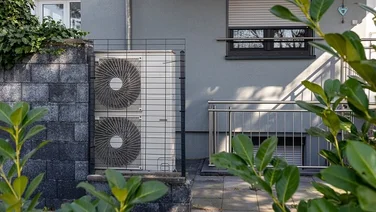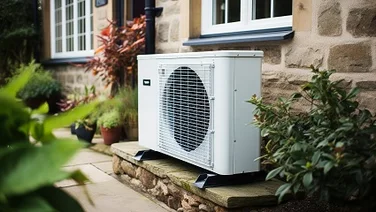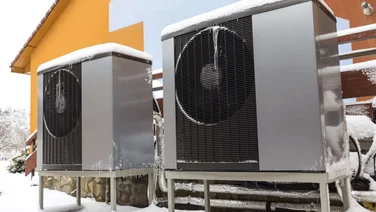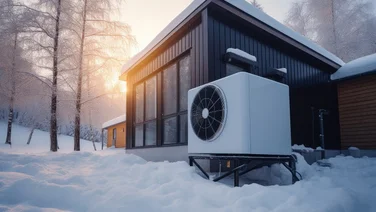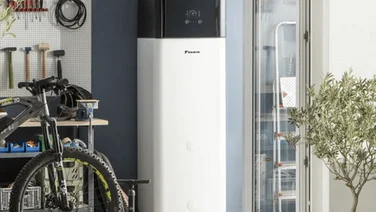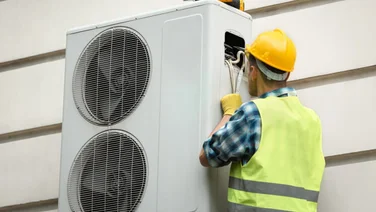We receive a small fee from trusted installers when you request a quote through our site. This helps us keep our content independent, well-researched and up to date – Learn more
- What is an air source heat pump?
- How much do air source heat pumps cost in Scotland?
- Heat pump running costs
- Are there any government grants for air source heat pumps in Scotland?
- How many people have air source heat pumps in Scotland?
- Is it worth getting an air source heat pump in Scotland?
- Summary
- Air source heat pumps work at temperatures as low as -25°C
- The average cost of an air source heat pump in Scotland is £10,000
- The Warmer Homes Scotland grant covers up to 100% of costs for a heat pump
The Scottish government has committed to achieving net-zero greenhouse gas emissions (GHG) by 2045. To address this, regulations have been introduce to phase out the installation of gas and oil boilers in new homes.
As of 2025, new residential constructions are required to utilise low-carbon heating systems, such as heat pumps or connections to district heating networks, instead of traditional fossil fuel-based boilers.
As a result, many homeowners have started looking into heat pump prices, to see if their home would pair well with one.
If you’re one of these homeowners, you might be wondering if this heating system will be able to warm your home on cold winter nights, given that it operates by drawing heat from the air.
We’ll explore more in the article below, explaining how much air source heat pumps cost, how they work, how many have been installed in Scotland, and whether it’s worth getting one.
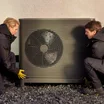
Install a heat pump
No matter where you live, heat pumps can save you money on your energy bills.
What is an air source heat pump?
An air source heat pump is a machine that heats your home – and your water system – by drawing heat from the outside air.
It does this by converting the heat it absorbs from outside air into a fluid, which is then heated with an electric compressor. This fluid is then transferred to the home’s heating and hot water systems using a heat exchanger.

Heat pumps operate on electricity, not gas, to transfer the heat into your home. Air source heat pumps typically have an efficiency rating of 300%, meaning it can produce three units of energy for every unit of electricity it absorbs.
They work in Scotland – even in cold weather. This is because they can pull residual heat (the heat that remains from when the air was warmer) from the air at temperatures as low as -15°C, or even -25°C. Average winter temperatures in Scotland stay well above this – typically hovering around 0°C to 3°C, with lows of -10°C considered unusual.
You can find out more about how heat pumps work in cold weather by visiting our page.
How much do air source heat pumps cost in Scotland?
The average cost of an air source heat pump in Scotland is around £10,000 for a three-bedroom house, to buy and install. This will be more for larger properties, since they require heat pumps with a larger wattage to meet the heating needs.

Based on property size, we’ve summarised the average cost of air source heat pumps in the table below:
Size of property | Cost of air source heat pump | Size of air source heat pump, in kilowatts (kW) |
|---|---|---|
Two bedroom | £7,000 | 5 kW |
Three bedroom | £10,000 | 10 kW |
Four bedroom | £13,000 | 13 kW |
Five bedroom | £15,000 | 16 kW |
Heat pump running costs
A ground source heat pump’s running costs for a three-bedroom household will typically come to around £939 per year.
The average air source heat pump will cost about the same, though this can vary significantly, depending on where you live in the UK.
| Heating method | Average monthly usage | Ofgem price cap 2025 | Standing charge | Monthly bill |
|---|---|---|---|---|
| Gas boiler | 960 kWh gas | 6.29p/kWh | 34.03p/day | £60.72 |
| Heat pump | 246 kWh electricity | 26.35p/kWh | 53.68p/day | £65.36 |
Are there any government grants for air source heat pumps in Scotland?
There are two grants available for air source heat pumps in Scotland: ECO4 and Warmer Homes Scotland.
Want to see if you can benefit from these schemes? We’ll give you a rundown of both grants in the following sections. You can also find out more by going to our air source heat pump grants page.
ECO4
ECO4 is the fourth phase of the Energy Company Obligation scheme, and provides a range of energy-saving home improvements – including heat pumps. It’s available until March 2026 to low-income households or households on the following benefits:
- Income-based Jobseekers Allowance (JSA)
- Income-related Employment & Support Allowance (ESA)
- Income Support (IS)
- Pension Credit Guarantee
- Credit Working Tax Credit (WTC)
- Child Tax Credits (CTC)
- Universal Credit (UC)
- Housing Benefit
- Pension Credit Savings Credit
To apply, you need to contact an energy supplier that is participating in the scheme, which you can find on Ofgem’s website.
Warmer Homes Scotland
Warmer Homes Scotland is a Scottish government scheme that provides financial support to low-income homeowners and tenants. In some cases, it can cover 100% of the costs of buying and installing a heat pump.
To be eligible for the scheme, your home needs to meet the following criteria:
- Have a poor energy rating
- Be 230 m2 or less.
- Meet the tolerable living standard of the Housing (Scotland) Act 2006
- Have a council tax band of A-F
- Household must have no central heating and include either a person who is over 75 or a person who is in receipt of a DS1500 or BASRiS certificate completed by a medical professional. Or, it should include a person who receives certain benefits
You can find the full list of requirements on the Warmer Homes Scotland website.
How many people have air source heat pumps in Scotland?
So far, around 24,000 domestic air source heat pumps have been installed in Scotland, according to Home Energy Scotland.
To give you an idea of the rate of installation, between 3,000 and 4,000 heat pumps are installed every year across Scotland, with the majority being air source heat pumps.
The Scottish government has funded several grant and loan schemes since 2020, aiming to install 80,000 to 100,000 heat pumps between 2021 and 2026. If they succeed, the current figures will increase substantially.
Is it worth getting an air source heat pump in Scotland?
Yes, it’s worth getting an air source heat pump in Scotland. After all, it could save you £4,340 over 20 years, when compared to a gas boiler – and this is without a grant. Plus, it’ll reduce your annual carbon footprint by 44%.
Before you get an air source heat pump, you should consider whether your home is suitable for one, and whether it makes financial sense for you.
Homeowners who want to install a heat pump will probably also need to upgrade their radiators to ones that are two times larger than standard, or install underfloor heating. Radiators need more surface area to warm your home because heat pumps produce heat at lower levels than boilers – around 40°C compared to 60°C for boilers.
Air source heat pumps are not recommended for properties with poor insulation for this same reason. Even with larger radiators, a property won’t be able to retain enough low-flow heat to stay comfortably warm if it isn’t well insulated – this would mean ideally having an Energy Performance Rating (EPC) of A, B, or C at the very least.
This means you’ll need to factor in the cost of installing new radiators when considering air source heat pumps. If your home is poorly insulated, you should look into double glazing, wall insulation, or loft insulation before the heat pump installation.
Summary
- There’s never been a better time to install an air source heat pump in Scotland
- Heat pumps feature heavily in the Scottish government’s plan to decarbonise domestic energy
- It’s already provided £20m in interest-free loans, 66% of which were used for heat pump installations, according to government data
- Tf you’re ready to get started with installing an air source heat pump, just put a few details into our quotes form. We’ll pass them on to our network of professional installers, who’ll reach out to you with their best prices


